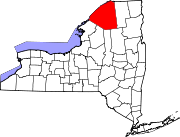History
Settlement began in June 1803, when the first settlement party arrived, led by Judge William Cooper of Cooperstown, New York.
The town was organized in 1806 from the town of Oswegatchie. DeKalb was one of the original ten towns of the county. In 1825, the part of DeKalb north west of Beaver Creek was taken to be part of the Town of DePeyster. In 1830, the Southeastern corner of DeKalb was made part of the Town of Hermon.
St. Regis and St. François Native Americans used to frequently visit the settlement on hunting expeditions. [3]
Geography
According to the United States Census Bureau, the town has a total area of 83.2 square miles (215 km2), of which 82.5 square miles (214 km2) is land and 0.7 square miles (1.8 km2) (0.82%) is water.
The Oswegatchie River flows through the western part of the town. Beaver Creek defines the northwestern town line.
U.S. Route 11 is a northeast–southwest highway in the south part of the town. New York State Route 812 intersects US-11 south of DeKalb village.
Demographics
Historical population| Census | Pop. | Note | %± |
|---|
| 1820 | 709 | | — |
|---|
| 1830 | 1,060 | | 49.5% |
|---|
| 1840 | 1,531 | | 44.4% |
|---|
| 1850 | 2,389 | | 56.0% |
|---|
| 1860 | 3,182 | | 33.2% |
|---|
| 1870 | 3,116 | | −2.1% |
|---|
| 1880 | 3,027 | | −2.9% |
|---|
| 1890 | 2,840 | | −6.2% |
|---|
| 1900 | 2,723 | | −4.1% |
|---|
| 1910 | 2,516 | | −7.6% |
|---|
| 1920 | 2,419 | | −3.9% |
|---|
| 1930 | 2,346 | | −3.0% |
|---|
| 1940 | 2,116 | | −9.8% |
|---|
| 1950 | 2,063 | | −2.5% |
|---|
| 1960 | 2,137 | | 3.6% |
|---|
| 1970 | 2,062 | | −3.5% |
|---|
| 1980 | 2,130 | | 3.3% |
|---|
| 1990 | 2,153 | | 1.1% |
|---|
| 2000 | 2,213 | | 2.8% |
|---|
| 2010 | 2,434 | | 10.0% |
|---|
| 2020 | 2,375 | | −2.4% |
|---|
As of the census [4] of 2000, there were 2,213 people, 792 households, and 582 families residing in the town. The population density was 26.8 inhabitants per square mile (10.3/km2). There were 889 housing units at an average density of 10.8 units per square mile (4.2 units/km2). The racial makeup of the town was 98.19% White, 0.27% African American, 0.27% Native American, 0.09% Asian, 0.32% from other races, and 0.86% from two or more races. Hispanic or Latino of any race were 0.27% of the population.
There were 792 households, out of which 37.4% had children under the age of 18 living with them, 57.4% were married couples living together, 9.6% had a female householder with no husband present, and 26.4% were non-families. 21.1% of all households were made up of individuals, and 8.2% had someone living alone who was 65 years of age or older. The average household size was 2.79 and the average family size was 3.23.
In the town, the population was spread out, with 30.2% under the age of 18, 8.5% from 18 to 24, 27.5% from 25 to 44, 23.4% from 45 to 64, and 10.3% who were 65 years of age or older. The median age was 34 years. For every 100 females, there were 101.0 males. For every 100 females age 18 and over, there were 102.1 males.
The median income for a household in the town was $33,173, and the median income for a family was $37,463. Males had a median income of $29,000 versus $23,050 for females. The per capita income for the town was $13,742. About 11.4% of families and 15.7% of the population were below the poverty line, including 23.2% of those under age 18 and 9.8% of those age 65 or over.
This page is based on this
Wikipedia article Text is available under the
CC BY-SA 4.0 license; additional terms may apply.
Images, videos and audio are available under their respective licenses.


